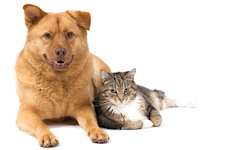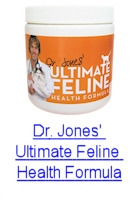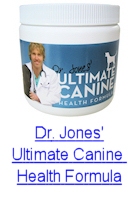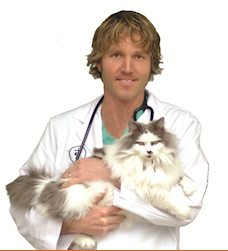 |
You are receiving this e-mail as a part of your subscription to Dr. Jones' newsletter, 'Veterinary Sec.rets'. See subscription information below. |
| |
|
 Good morning and a Happy Tuesday to you, fellow loyal readers! Good morning and a Happy Tuesday to you, fellow loyal readers!
Wanting to give your pet something daily to prevent disease?
Here is what I am giving to both my dogs and
cats.
It's working well for arthritic pain in my dog Jesse, and my cats Cleo and Gussie.
Get your 50% OFF trial here:

For Dogs: http://www.thedogsupplement.com
For Cats: http://www.thecatsupplement.com
----------------------------------------------
Dangerous Dog Poop?
----------------------------------------------
This is a Wiki Pets article..
Cleaning up after your dog can be a stinky job, but someone's gotta do it.. Constant clean up is necessary for a healthy environment for you and your family.
Is Dog Poop Dangerous??
Love, food, and shelter were all things you actively agreed to providing for your new pet when you purchased or adopted them. Sanitation and cleanup are also important facets of pet ownership that are critical to the health and well-being of your entire family.
Dog feces is as high as 3rd on the list of contributors to contaminated water. Cleaning up after your dog is one guarantee in the life of every pet owner. Left un-checked, your yard can quickly turn into a mine field of feces in a week or less. On average, dogs do a number two twice per day which adds up to about 14 piles of poo in just one week, per dog. Contrary to popular belief, dog feces is not fertilizer and does not provide any benefit to the soil.
-------------------
So whats in it?
-------------------
Dog feces may contain parvovirus, whipworms, hookworms, roundworms, threadworms, campylobacteriosis, giardia, and coccidia. If left unattended, these parasites will contaminate the water, soil, and can even cause infection in both pets and humans (especially children). The microscopic Hookworm larvae can be passed to another pet or person directly through the skin or by accidental ingestion as can other bacteria.
------------------------------------------
Which parasites can humans acquire?
------------------------------------------
Yes, humans are capable of contracting hookworms, tapeworms, threadworms and campylobacteriosis. This is the most significant reason to avoid allowing dogs (especially puppies) to like your face and mouth – affectionately known as “puppy kisses”. If a dog has recently eaten feces or attempted to groom their hind quarters and come into contact with this infectious material, there is a chance the parasites will be passed directly into your mouth. Children are especially venerable to infection because they tend to enjoy playing in the dirt, where parasites such as hookworm larvae lay dormant waiting for a new host. Young children may also put dirty hands or toys in their mouth, further increasing the chance for infectious material consumption.
-------------------------
Disease prevention
-------------------------
Pet feces can be catastrophic to the local water table, contaminating nearby ponds, lakes, rivers and drinking water. When feces is allowed to remain on the soil for long periods, rainstorms will begin to dilute and break apart the feces and slowly spread the bacteria on other contaminants into local water sources. If your yard happens to hold water for extended periods of time, the problem may be amplified.
To avoid potential infection, dog feces should be removed from the yard every 1 – 7 days, depending on the size of the dog and number of dogs in the household. Larger dogs will need more frequent cleanup, as will households with more than 1 dog. A family with one Pomeranian will have a much lower environmental impact than the family with 2 Great Danes.
If you are too busy to clean up after your dog, or the thought of it just makes you gag, there are many services available today, such as Pet Butler, that will gladly do the dirty work for you. A sanitation expert will locate and remove any feces found on premises 1 or more times per week usually from around $10.00. Some areas do have legal statutes that regulate the cleanup and disposal of pet waste, so be sure to contact your local health board for more information.
//////////////////////////////////////////////
P.S. Do I agree with the entire article??
No
I am a fan of dog kisses- my dog Lewis is notorious for this, and the supposed parasite risk is little. The mental health benefits way outweigh any risk.
The parasite issue is real, but more of a concern for toddlers that put EVERYTHING in their mouth.
Regularly deworm your pets if you have any toddlers around. And try and avoid eating dog or cat feces yourself :-)

P.P.S. I am a big fan of disease prevention, especially naturally.
Here is what I am using for my own pets to naturally prevent disease:
PLUS you'll get 3 BIG bonuses that are yours to keep.
For Dogs: http://www.thedogsupplement.com
For Cats: http://www.thecatsupplement.com
Heal Your Pets At Home!
Best Wishes,
Dr Andrew Jones

PRIVACY POLICY: We will never rent, sell, loan, provide, barter, exchange or in any way make available your personal information to others. You can unsubscribe or change your email address at any time using the links at the bottom of this email.
FTC DISCLOSURE: You can assume that in some cases Dr Andrew Jones and his Internet Company, Four Paws Online Ltd, has an affiliate relationship or material connection with the providers of the goods or service mentioned in this message and may be compensated if you are to purchase from an affiliate link. You should always perform due diligence before purchasing goods or services from anyone - online or offline. Be a responsible pet owner, be kind to animals and if you are not a breeder, spay or neuter your pets.
Copyright 2010 Four Paws Online Ltd.
Tel: 1-800-396-1534
Fax: 1-888-398-1378
www.veterinarysecretsrevealed.com
support@veterinarysecretsrevealed.com
|
|
|
|